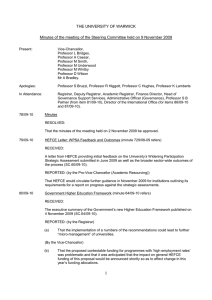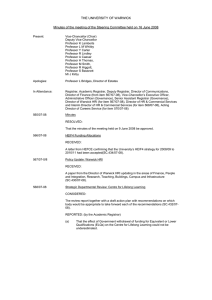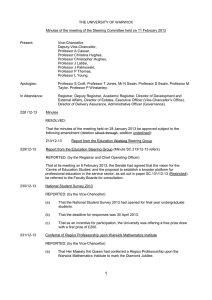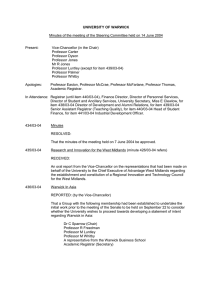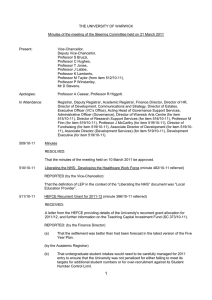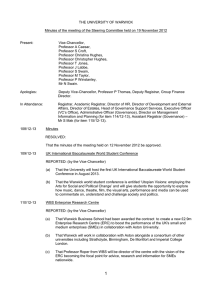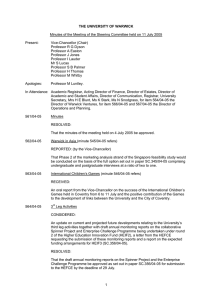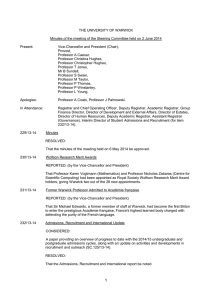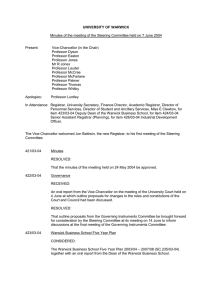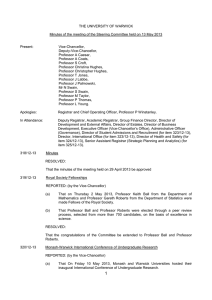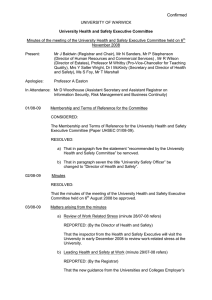UNIVERSITY OF WARWICK COUNCIL Present:
advertisement
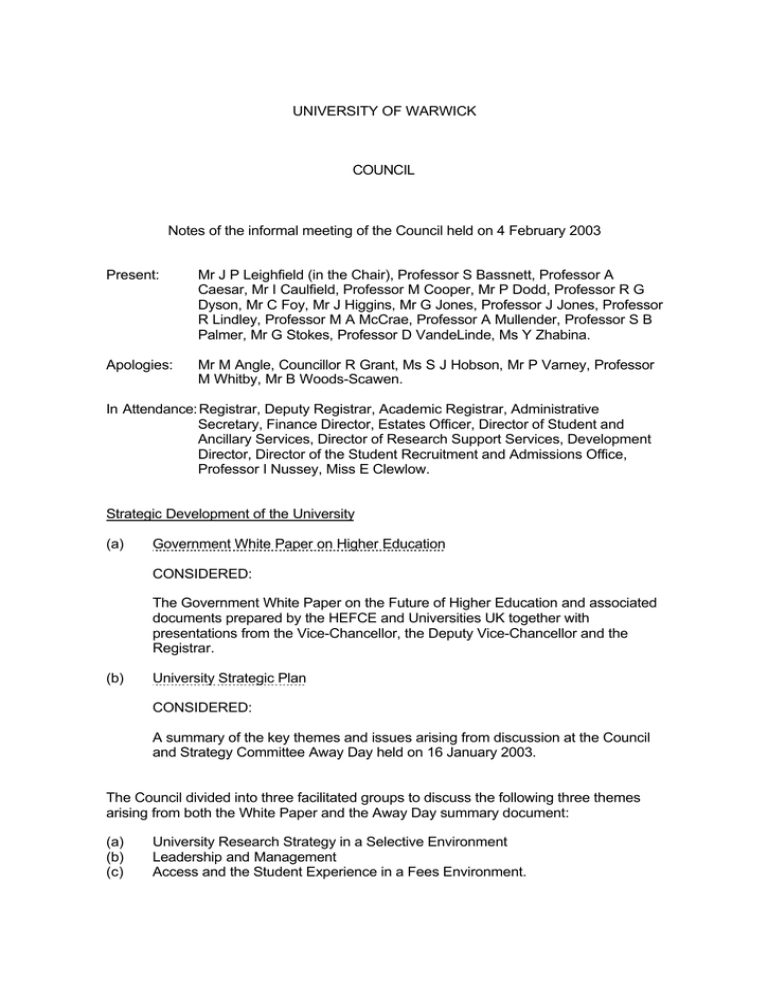
UNIVERSITY OF WARWICK COUNCIL Notes of the informal meeting of the Council held on 4 February 2003 Present: Mr J P Leighfield (in the Chair), Professor S Bassnett, Professor A Caesar, Mr I Caulfield, Professor M Cooper, Mr P Dodd, Professor R G Dyson, Mr C Foy, Mr J Higgins, Mr G Jones, Professor J Jones, Professor R Lindley, Professor M A McCrae, Professor A Mullender, Professor S B Palmer, Mr G Stokes, Professor D VandeLinde, Ms Y Zhabina. Apologies: Mr M Angle, Councillor R Grant, Ms S J Hobson, Mr P Varney, Professor M Whitby, Mr B Woods-Scawen. In Attendance: Registrar, Deputy Registrar, Academic Registrar, Administrative Secretary, Finance Director, Estates Officer, Director of Student and Ancillary Services, Director of Research Support Services, Development Director, Director of the Student Recruitment and Admissions Office, Professor I Nussey, Miss E Clewlow. Strategic Development of the University (a) Government White Paper on Higher Education CONSIDERED: The Government White Paper on the Future of Higher Education and associated documents prepared by the HEFCE and Universities UK together with presentations from the Vice-Chancellor, the Deputy Vice-Chancellor and the Registrar. (b) University Strategic Plan CONSIDERED: A summary of the key themes and issues arising from discussion at the Council and Strategy Committee Away Day held on 16 January 2003. The Council divided into three facilitated groups to discuss the following three themes arising from both the White Paper and the Away Day summary document: (a) (b) (c) University Research Strategy in a Selective Environment Leadership and Management Access and the Student Experience in a Fees Environment. During the feedback session the following themes and questions were reported as having arisen in the course of group discussions: (a) University Research Strategy in a Selective Environment (i) The key importance of research in underpinning and developing the University’s national and international reputation. (ii) The need to maximise the impact of the University’s high quality research by focusing upon a limited number of research areas, exploring the opportunities afforded by interdisciplinary research and developing advantage over competitor institutions with established and larger research bases. (iii) The need for the University to focus its research activity to ensure the attainment of critical mass and international reputation while ensuring that increased focus must be balanced by an openness to diversification and exploiting the advantage offered by new opportunities. (iv) The need to overcome the intellectual and structural boundaries between faculties and departments in order to promote and incentivise interdisciplinary research activity. (v) The benefits of developing the University’s institutional research strategy as a facilitative rather than a regulatory mechanism through: (vi) (b) (A) Providing a funding methodology and structural framework to support the development of cross-disciplinary initiatives. (B) Identifying the differing faculty and departmental needs required to facilitate high quality research. (C) Balancing the need for planning with the flexibility implicit in a commitment to attracting high calibre staff when the opportunity arises and providing those staff with a well resourced research environment. The need to establish the implications of the introduction of 6* research status for Warwick in terms of attracting new funding and being internationally competitive. Leadership and Management (i) That the University was on the whole well-managed but needed to address the external perception of the HE sector in general as poorly managed and to continue to examine the transparency and efficiency of its own internal decision-making mechanisms. (ii) That the development of the University’s Human Resources Strategy would be key to ensuring that the University’s workforce was treated fairly and equitably while ensuring and encouraging best performance. This would require further consideration of: 2 (c) (A) Possible withdrawal from collective national pay bargaining through UCEA. (B) Re-examination of reward and staff development structures with a view to developing means of recruiting, retaining and motivating staff, across all grades, possibly revisiting the experience of previous initiatives, such as the Warwick Research Fellowship Scheme, and providing educational opportunities to non-academic staff. (C) Effective internal communications strategies. (iii) That the University must continue to develop its strategy in accordance with its mission while retaining the flexibility to adapt and exploit changes in the external environment. (iv) Identifying, defining and supporting those activities that make the Warwick ‘brand’ and culture distinctive, and which had been instrumental in the University’s success thus far and capitalising upon this distinctive profile to ‘break out of the pack’. Access and the Student Experience in a Fees Environment (i) That among the consequences of charging higher fees would be raised student expectations of the University experience and the challenge of maintaining and widening access to Higher Education. (ii) In order to tackle the challenges of widening access, the University must consider: (A) (B) (C) (D) Its image in regard to the prospective student body. Its relationship with schools, both locally and nationally. The potential use of portfolio admissions, bursaries and scholarships and other means of student support including the availability of paid employment for students. Opportunities for introducing a wider range of programmes aimed at non-traditional students such as those provided by 2+2 and Foundation Degrees. It was also acknowledged that the University’s future institutional strategy must be developed not only in relation to the likely impact of the Government White paper but also on the basis of broader national and international considerations including the global economic and political environment. The Chair of the Council noted that the very positive outcome of the meeting would feed into the development of the University’s strategic plan and the financial planning process. CEC/ec/council minutes/4feb03min 7/02/03 3
